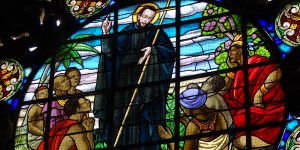Help Aleteia continue its mission by making a tax-deductible donation. In this way, Aleteia's future will be yours as well.
*Your donation is tax deductible!
Every time a new slave ship from Africa arrived in harbor, Father Peter Claver was there to meet it, his arms full of biscuits and lemons. He distributed his gifts, which he had spent the previous week begging from the townspeople of Cartagena, and then bent to kiss the deceased and say a prayer. He carried the sick to shore in his arms and sat them down in the shade.
It was something of a miracle that Fr. Claver could carry anything at all, let alone another human being. He ate almost nothing and lived on a starvation diet. He gave everything he had for the care of the enslaved people who disembarked in the harbor once every few weeks. Before they were sold into the backbreaking and cruel conditions of the sugar farms, Fr. Claver was able to spend a few days with them, treating them with tenderness.
Center of the slave trade
At that time, in the 17th century, Cartagena was the center of the slave trade in the New World. Located in the Caribbean near the isthmus of Panama, it was unrelentingly hot and equatorial, miserable with disease. Enslaved people were brought over from Africa to work the sugar fields. About a third of them died on the forced journey from Africa and many more would lose their lives in the subsequent years due to the inhumane conditions in which they were kept. Claver shared their misery as much as he could. As much as he was able, he became their servant.
In his book A Saint In the Slave Trade, Arnold Lunn describes how Claver had the slaves sit down while he taught them about Jesus. Indignant slave-traders would interrupt, saying it was improper for the slaves to sit while he stood. He simply responded that they were his guests and, in the eyes of Christ, they were more important than him. He continued to stand. They continued to sit.
The legendary cloak
One of his few possessions was an old cloak. At times, the slaves sitting in his catechism classes were so diseased and in pain that they had trouble sitting. Without a thought, he would wrap his cloak around their shivering bodies or bundle it up into a pillow for their comfort. His interpreters were horrified, thinking how filthy and unhealthy the cloak must have become because of this, but without washing it, Claver would put it right back on once it was returned. Lunn writes, “The cloak was to serve many uses during his ministry: as a veil to disguise repulsive wounds, as a shield for leprous and lupus-ravaged black slaves, as a pall for those who had died, and a pillow for the sick. The cloak was soon to acquire a legendary fame.”
The cloak is a challenge. It's very easy to claim that I love humanity -- to vote the right way, say the right things on social media, give some money to a charity, and then call it a job well done.
The cloak is personal
Love calls us into particulars. Love demands that I consider specific persons, the person right in front of me the person who needs my time and attention, the person who frustrates me or bothers me. How do I react when my toddler begs me to play a brain-numbingly boring game with her when all I want to do is watch television alone in my room? Do I love her in that moment?
How about the parishioner who needs to talk to me about a personal crisis, but I've had a long day and am exhausted. Do I put them off?
The cloak is a challenge to make that phone call to my grandmother, hold my tongue when I want to gossip, take the extra minute to check in with a parishioner I find it difficult to relate to. There's a specific life I've been given, with all the messiness and frustration of building connections with the people in my orbit. This is where love begins.
It's harder to love in this way. The cloak gets threadbare and damaged. It asks for sacrifice that's more than theoretical. This more difficult path, though, is open to all of us. We each have opportunities every single day to love the particular life we've been given and to spread that love among those we share our days with.
Claver, I imagine, wasn't particularly well known outside of Cartagena, but among the people who knew him, those he had personal contact with, those with whom he was able to interact even for a few moments, perhaps that cloak changed their lives. It may have been the first and last time anyone showed personal concern for them. That's a tremendous legacy to leave, all because he shared a tattered old cloak. Perhaps our small gifts of love to each other aren't so small after all.










